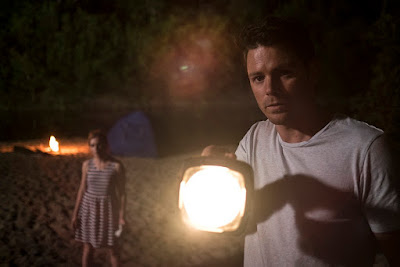I don't have time to go back and view the beginning of THREE PEAKS all over again, but if I'm not mistaken, this movie literally has only three characters whom we see for the duration of the film: wife and mother, Lea; her son, Tristan; and her significant other, Aaron, who is trying ever harder to be the step-father that Tristan clearly needs -- even though the boy is hanging on for dear life to his birth dad (whom we never see but are made aware of via dad's persistent phone calls to his son).
In Jan Zabeil's 2017 film, just now receiving its American theatrical debut, those titular three peaks refer to the name of the mountain top to which the couple their boy goes on a vacation which takes up the final half (or more) of the film.
Yet these three peaks could as easily refer to the three characters, each one trying to be the most significant and strongest of all. Writer/ director Zabeil (shown at left), German born and raised, has given us a most unusual movie and a very good one -- in which family dynamics turn into a life-and-death situation without anyone actually being the villain or hero.
Instead, attempts at closeness and caring -- thanks to small, incremental mistakes by an adult, along with the kind of major foolishness from a child that suddenly endangers him and his caretaker -- result in the possibility of utter destruction. The filmmaker is particularly wise in setting up the situation carefully, so that
we only slowly and unsurely realize the extent of how troubled is young Tristan, played with a combination of fierceness, fear and caring by the fine young actor, Arian Montgomery (shown above, left, and below, right). His imagined nemesis and actual hope, Aaron, is played with wonderful mesh of clarity, strength and insecurity by Alexander Fehling (above, right, and below, left), of Young Goethe in Love and Labyrinth of Lies).
The third wheel -- unfortunately, by virtue of how the movie is set up and executed, she is just that -- is the wife and mother, played as well as her circumscribed role allows, by Bérénice Bejo. Ms Bejo (below, right) is a fine actress, as she has often shown us, and she does a good job again here, though she is confined to the first half of the film, during which her character demonstrates a love for both her man and her son, as well as perhaps a little too much connection to that ex-husband which abets, without meaning to, some of what happens plot-wise.
Three Peaks is packed with the kind of offbeat, careful behavior found when a family divides and then opens to include someone new. Everyone is just a little on-guard, trying to do the right thing but screwing up now and then. As the film progresses and the situation becomes ever more dire, it takes on the feeling of a thriller, even as it remains a kind of character study of both Tristan and Aaron, and to a lesser extent, of Lea.
From Greenwich Entertainment and running a slowly engulfing 90 minutes, Three Peaks is currently set for screening in ten cities across the country, opening this Friday, June 28, in New York City at the IFC Center, and then on Friday, July 12 in Los Angeles at the Landmark NuArt. Click here and then scroll down to view all currently scheduled playdates, cities and theaters.




























































